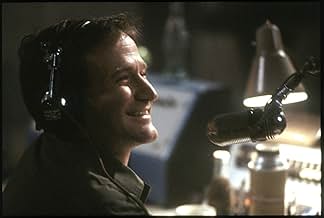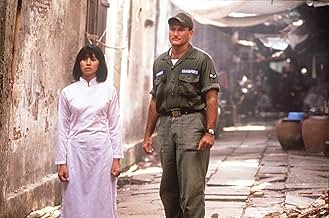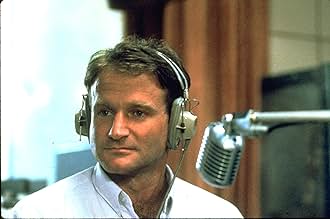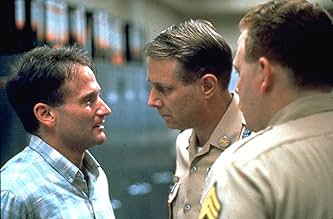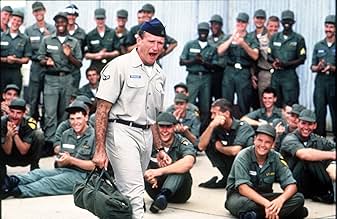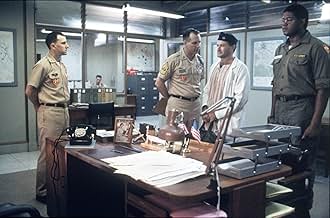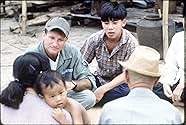In 1965, an unorthodox and irreverent DJ named Adrian Cronauer begins to shake up things when he is assigned to the U.S. Armed Services radio station in Vietnam.In 1965, an unorthodox and irreverent DJ named Adrian Cronauer begins to shake up things when he is assigned to the U.S. Armed Services radio station in Vietnam.In 1965, an unorthodox and irreverent DJ named Adrian Cronauer begins to shake up things when he is assigned to the U.S. Armed Services radio station in Vietnam.
- Director
- Writers
- Stars
- Nominated for 1 Oscar
- 7 wins & 4 nominations total
Tom T. Tran
- Tuan
- (as Tung Thanh Tran)
Dan Stanton
- Censor #1
- (as Dan R. Stanton)
Don Stanton
- Censor #2
- (as Don E. Stanton)
John Marshall Jones
- MP #2
- (as J.J.)
- Director
- Writers
- All cast & crew
- Production, box office & more at IMDbPro
Featured reviews
I just sat through a DVD of this movie,the second(?)time I'd seen this film. The last time I could recall seeing this,it was on pay-per-view television in a hotel(the Red Lion I think it was) room,August of 1988,so my memories of this film could use a refreshing. I'm glad I got refreshed.
In 1965,Airman Adrian Cronauer(Robin Williams,in the first of his four Academy Award nominations)is brought on to do an Armed Forces Radio stint in Vietnam. Behind the microphone,Cronauer lets loose,much to the surprise and delight of many of the troops and servicemen around the area of combat. His combination of off-the-wall humor,impressions,sound gags and quick wit,mixed with his love of free-wheeling Rock music of the era,is pretty much welcomed in the area,save for a few angry sorts: a Napoleon-complexed intermediate CO named Hauk(Bruno Kirby,unrecognizable but for the voice) and a stiff-lipped,quietly vindictive middle commander named Dickerson(J.T.Walsh,so good here it would seem like this typecast him). As this is going on,Cronauer becomes smitten with a local girl(Chinatra Sukapatra,spelling?)and befriends her brother(Tung Thanh Tran),which leads the popular DJ down a road of self-discovery.
With excellent support from Forrest Whitaker(one of my favorites!he ends up sort of counter-balancing Williams' manic frenzy with nerdish normalcy as his buddy/assistant/guide),Richard Edson,Noble Winnigham,Robert Wuhl and Cu Ba Nguyen(as the oily GI bar proprietor)among others,this film,directed by Barry Levinson(whose work hasn't been this good in what feels like forever,certainly not since Avalon or Rain Man) and written by Mitch Markowitz,it is arguable one of the deftest films to create and maintain a balance between the horrors and inhumanity of war and the humor and pathos that are very much present in it. Robin Williams' fans may get much more out of this that those who aren't,but I think even many of those who don't consider themselves fanciers of his talents should be able to appreciate this. The images were powerful enough that they stuck with me some after the first time I saw GMV and after a second time I feel like can appreciate even more out of this movie.
In 1965,Airman Adrian Cronauer(Robin Williams,in the first of his four Academy Award nominations)is brought on to do an Armed Forces Radio stint in Vietnam. Behind the microphone,Cronauer lets loose,much to the surprise and delight of many of the troops and servicemen around the area of combat. His combination of off-the-wall humor,impressions,sound gags and quick wit,mixed with his love of free-wheeling Rock music of the era,is pretty much welcomed in the area,save for a few angry sorts: a Napoleon-complexed intermediate CO named Hauk(Bruno Kirby,unrecognizable but for the voice) and a stiff-lipped,quietly vindictive middle commander named Dickerson(J.T.Walsh,so good here it would seem like this typecast him). As this is going on,Cronauer becomes smitten with a local girl(Chinatra Sukapatra,spelling?)and befriends her brother(Tung Thanh Tran),which leads the popular DJ down a road of self-discovery.
With excellent support from Forrest Whitaker(one of my favorites!he ends up sort of counter-balancing Williams' manic frenzy with nerdish normalcy as his buddy/assistant/guide),Richard Edson,Noble Winnigham,Robert Wuhl and Cu Ba Nguyen(as the oily GI bar proprietor)among others,this film,directed by Barry Levinson(whose work hasn't been this good in what feels like forever,certainly not since Avalon or Rain Man) and written by Mitch Markowitz,it is arguable one of the deftest films to create and maintain a balance between the horrors and inhumanity of war and the humor and pathos that are very much present in it. Robin Williams' fans may get much more out of this that those who aren't,but I think even many of those who don't consider themselves fanciers of his talents should be able to appreciate this. The images were powerful enough that they stuck with me some after the first time I saw GMV and after a second time I feel like can appreciate even more out of this movie.
Let me be perfectly frank and say right away that I watched this to experience Robin Williams at his best. That guy has so much comedic talent, it's unreal. I mostly got what I expected from this movie... but I found that it also contained some truths about the Vietnam war. The movie has plenty to offer on both fronts. Any fan of Williams' comedy will definitely enjoy it, and I think most war-movie buffs will too... if they can keep an open mind, and accept a slightly different approach to the genre. The way the seriousness of war is underplayed for most of the film really works to enhance the effect of it when it is shoved right in our faces, when we are forced to acknowledge it. We forget how serious and all-consuming war is, just like Adrian had(not necessarily the real one, I know nothing of him except of what the film told me, and as far as I understand, that's not that accurate a portrayal of him), only to be confronted with it. More effective than several big war movies. The plot is very good. The pacing is great, the movie keeps moving pretty much all through the film. The characters are well-written and credible. The acting is good pretty much all-round, and Williams proves once again that he can do drama just as well as comedy. The humor is typical Robin Williams. A very good film, and an unusual war movie. I recommend this to fans of Robin Williams and war movies. 7/10
GOOD MORNING, VIETNAM / (1987) ***1/2 (out of four)
By Blake French:
Robin Williams is about as good as they come at doing stand up comedy, and in "Good Morning, Vietnam" director Berry Levinson gives him everything he needs to make the film go above and beyond the average satire. From his outgoing sense of humor, to his aggressive personality, and dozens of vocal effects, he portrays his character with interactive zest. Who can resist the awakening voice of Williams on the radio yelling "Good Morning Vietnam." This is a film that conquers the test of time.
"Good Morning, Vietnam" tells the story of a lively disc jockey who gets a job on Armed Forced Radio during the Vietnam War. Robin Williams is the fast-talking Adrian Cronauer, and who better to play the part than he. Although this character is one-dimensional (we are never informed on his background, marital status, where he comes from, what he did before we meet), as the movie continues he gradually begins to change into a deeper, more meaningful person.
The story moves along smoothly; the narrative through-line is consistent as each scene relates to the next. Although little momentum or suspense can be noticed, the film does have several underlining themes, often viewed upon in a Stanley Kubrick style: sarcastic and uncompromising. We see how much a little humor and jazz can greatly enlighten the hard-core atmosphere of the military during Vietnam, and how it can thoroughly confuse the bleeding heart officials.
The film hangs by the skin of its teeth for active conflict tension. Beyond people objecting to the actions of Williams' character, there is just not a lot of tension within the story, and at some points my interest wandered. "Good Morning, Vietnam" is merely a portrait of Robin Williams releasing his perennial comedy, and unfortunately that does happen to get old quite quickly; the majority of an audience can only watch the humor for so long until it becomes old and somewhat stale.
"Good Morning, Vietnam" is definitely not a flawless film, but we do empathize for the main character, the scenes effectively capture the attitude and mood during the war, and the dialogue and writing feel accurate and involving. Barry Levinson has directed a marvelous comedy, one that is not all about making us laugh, but also makes us think.
By Blake French:
Robin Williams is about as good as they come at doing stand up comedy, and in "Good Morning, Vietnam" director Berry Levinson gives him everything he needs to make the film go above and beyond the average satire. From his outgoing sense of humor, to his aggressive personality, and dozens of vocal effects, he portrays his character with interactive zest. Who can resist the awakening voice of Williams on the radio yelling "Good Morning Vietnam." This is a film that conquers the test of time.
"Good Morning, Vietnam" tells the story of a lively disc jockey who gets a job on Armed Forced Radio during the Vietnam War. Robin Williams is the fast-talking Adrian Cronauer, and who better to play the part than he. Although this character is one-dimensional (we are never informed on his background, marital status, where he comes from, what he did before we meet), as the movie continues he gradually begins to change into a deeper, more meaningful person.
The story moves along smoothly; the narrative through-line is consistent as each scene relates to the next. Although little momentum or suspense can be noticed, the film does have several underlining themes, often viewed upon in a Stanley Kubrick style: sarcastic and uncompromising. We see how much a little humor and jazz can greatly enlighten the hard-core atmosphere of the military during Vietnam, and how it can thoroughly confuse the bleeding heart officials.
The film hangs by the skin of its teeth for active conflict tension. Beyond people objecting to the actions of Williams' character, there is just not a lot of tension within the story, and at some points my interest wandered. "Good Morning, Vietnam" is merely a portrait of Robin Williams releasing his perennial comedy, and unfortunately that does happen to get old quite quickly; the majority of an audience can only watch the humor for so long until it becomes old and somewhat stale.
"Good Morning, Vietnam" is definitely not a flawless film, but we do empathize for the main character, the scenes effectively capture the attitude and mood during the war, and the dialogue and writing feel accurate and involving. Barry Levinson has directed a marvelous comedy, one that is not all about making us laugh, but also makes us think.
Good Morning, Vietnam (1987)
A lighthearted but deadly serious anti-war film, actually. This is of course a Robin Williams movie so that it is his schtick, brilliant and inspired, that makes it soar. The best of it, including the famous riff when he first gets on the air as the new Saigon DJ, is hilarious and breathtaking. There is a plot, sort of, as he goes through a rise and fall at the military radio station, but it's more about his shining moments behind the microphone than anything else.
The "else" in this movie is, however, most of the movie. That is, Williams has a serious role as an offbeat renegade in a chaotic world surrounded by a range of sensible and very insensible officers and colleagues. At the most extreme, when we see a Vietnamese village firebombed while Louis Armstrong sings "It's a Wonderful World," the sentiment is so cloying it makes you cry, and you're not sure why because you know it's just over the top manipulation. Likewise when Williams is caught in a traffic jam with other military vehicles and he warms up the soldiers by humanizing everyone and making them feel like they really should be back home. Which they should be, as we know in retrospect.
So the movie has another side that's kind of sentimental and simplistic, whatever its good pacifist intentions. Williams is a decent actor—I'm not one of those who thinks he's brilliant outside of his funny roles—and so it holds up pretty well. But the plot line keeps the movie from really finding pathos, or comedy, or warmth, or tragedy of a dramatic kind, in the scenes outside the radio station. And I think that's what it intended.
For those who don't know, it's worth adding that the main character, Adrian Cronauer, was a real person, and still is—he's a staunch Republican (Williams was not, to be sure) and an innovator in radio in Vietnam. He also co-wrote the screenplay, I assume working on the scenes that he would know best rather than the larger saccharine plot aspects. A great story, and the real Cronauer deserves credit for inspiring it, and helping it along. He was, along with most of us, "Godsmacked" when he heard the news of Williams's death.
A lighthearted but deadly serious anti-war film, actually. This is of course a Robin Williams movie so that it is his schtick, brilliant and inspired, that makes it soar. The best of it, including the famous riff when he first gets on the air as the new Saigon DJ, is hilarious and breathtaking. There is a plot, sort of, as he goes through a rise and fall at the military radio station, but it's more about his shining moments behind the microphone than anything else.
The "else" in this movie is, however, most of the movie. That is, Williams has a serious role as an offbeat renegade in a chaotic world surrounded by a range of sensible and very insensible officers and colleagues. At the most extreme, when we see a Vietnamese village firebombed while Louis Armstrong sings "It's a Wonderful World," the sentiment is so cloying it makes you cry, and you're not sure why because you know it's just over the top manipulation. Likewise when Williams is caught in a traffic jam with other military vehicles and he warms up the soldiers by humanizing everyone and making them feel like they really should be back home. Which they should be, as we know in retrospect.
So the movie has another side that's kind of sentimental and simplistic, whatever its good pacifist intentions. Williams is a decent actor—I'm not one of those who thinks he's brilliant outside of his funny roles—and so it holds up pretty well. But the plot line keeps the movie from really finding pathos, or comedy, or warmth, or tragedy of a dramatic kind, in the scenes outside the radio station. And I think that's what it intended.
For those who don't know, it's worth adding that the main character, Adrian Cronauer, was a real person, and still is—he's a staunch Republican (Williams was not, to be sure) and an innovator in radio in Vietnam. He also co-wrote the screenplay, I assume working on the scenes that he would know best rather than the larger saccharine plot aspects. A great story, and the real Cronauer deserves credit for inspiring it, and helping it along. He was, along with most of us, "Godsmacked" when he heard the news of Williams's death.
Made at a time when films on the Vietnam war were being produced by America at a healthy rate, Good Morning, Vietnam comes across as the sort that falls into both 'types' that were being produced at the time. Platoon got under the skin of Vietnam, telling the events from an individual's perspective through voiceovers without relying on a lot of causality, rather the everyday tasks and events that occur. Full Metal Jacket was an interesting beast in the sense most of its more intense scenes didn't actually happen in Vietnam but rather at home on the training ground. But both were in a sensible tradition and took attention away from the Reaganism inspired 'action' films that were Rambo: First Blood Part II and the like.
Good Morning, Vietnam falls into both these sorts of Vietnam war films. On one hand it is a serious film about the war and deals with serious issues such as morale and how dangerous conflict with the enemy actually is without doing what Rambo did by turning the war genre into a sub-division of the action genre. At one point in the film, DJ and lead character of the film Adrian Cronauer (Williams) finds himself in a hostile area out in the jungle and you do feel the shift in atmosphere the film briefly moves into in the sense this guy is not a soldier but he is in a dangerous position and he isn't equipped with how to get through it. There is another scene in which a street side bomb goes off and Adrian is caught up in the middle of it, further reminding us of the war zone and cleverly shifting the aura.
But the film does fall into the genre of comedy and while it does so, it never distracts us from the fact this is taking place during a war unlike First Blood: Part II which could really have been an action film set amongst any backdrop. Good Morning, Vietnam does not ignore its comedy roots either and gives us genuinely entertaining disc jockey rants from Williams who shines with his animation and ad-libbing, further reminding us of a later film of his, Aladdin, and how he really was the star of that piece.
The best parts of Good Morning, Vietnam actually raise issues to do with oppositional reading. As a character, Adrian is one of those charismatic individuals who is perhaps more focused on entertaining his audience first but when repercussions to do with that want to entertain arise, it is an oppositional reading to something that seems innocent enough. There are a couple of scenes and incidences that deal with this theme of oppositional reading. One that springs to mind takes place in a bar in which Adrian has brought a Vietnamese friend whom he teaches in an English class. The trouble is, it's a G.I. bar and certain soldiers have an issue with the Vietnamese person being there. It is Adrian's carefree and relaxed attitude to letting the individual come with him to the bar that has upset certain others around him, resulting in an oppositional opinion on whether the Vietnamese person should be allowed there. One says he can, others say he can't and conflict erupts.
This battle is constantly going on within the boundaries of the radio studio and exists between Adrian and the censors who blank out all the bad news such as deaths and bombings, failing to deliver the real news, and instead keep morale from going below a certain point. Adrian's style of giving the people what they should hear in a charismatic style also rubs off spawning a sub-story revolving around a small school that teaches Vietnamese people the English language. Before hand, they were learning very basic words and phrases but after Adrian takes over, New York City slang or 'jargon' is the name of the game and while you wouldn't find English as a foreign language classes doing this sort of thing, Adrian brings his charismatic style to a class, turning it from formal to informal.
The theme here is that he's giving them exactly what he feels they need to know, not what the curriculum demand they know. It is the same with the radio station and the news censorship; giving people what they have a right to know vs. what a higher power say they should know. The principal foil for Adrian is Lt. Steven Hauk (Kirby) who is against Adrian's style of parody and constant joking but when he is put on air, the best he can do is adopt the voice and role of a Frenchman as he mocks and plods his way through airtime. It is a battle that the oppositional readers loose since morale falls drastically after Adrian is taken off and he is forced to be reinstated because of this.
Good Morning, Vietnam carries a pumping soundtrack which is what you'd expect for a film about a DJ and an emphasis on radio and its constant referencing to popular culture, gliding from The Wizard of Oz to Eleanor Roosevelt makes Williams' scenes consistently fun to watch. But other than this, it gives some political stances without ever feeling forced with the 'Wonderful World' montage over wartime action and juxtaposes James Brown's music over other scenes of wartime action. The film is a success in comedy and drama, a rarity of sorts given Dr. Strangelove supposedly set the standards.
Good Morning, Vietnam falls into both these sorts of Vietnam war films. On one hand it is a serious film about the war and deals with serious issues such as morale and how dangerous conflict with the enemy actually is without doing what Rambo did by turning the war genre into a sub-division of the action genre. At one point in the film, DJ and lead character of the film Adrian Cronauer (Williams) finds himself in a hostile area out in the jungle and you do feel the shift in atmosphere the film briefly moves into in the sense this guy is not a soldier but he is in a dangerous position and he isn't equipped with how to get through it. There is another scene in which a street side bomb goes off and Adrian is caught up in the middle of it, further reminding us of the war zone and cleverly shifting the aura.
But the film does fall into the genre of comedy and while it does so, it never distracts us from the fact this is taking place during a war unlike First Blood: Part II which could really have been an action film set amongst any backdrop. Good Morning, Vietnam does not ignore its comedy roots either and gives us genuinely entertaining disc jockey rants from Williams who shines with his animation and ad-libbing, further reminding us of a later film of his, Aladdin, and how he really was the star of that piece.
The best parts of Good Morning, Vietnam actually raise issues to do with oppositional reading. As a character, Adrian is one of those charismatic individuals who is perhaps more focused on entertaining his audience first but when repercussions to do with that want to entertain arise, it is an oppositional reading to something that seems innocent enough. There are a couple of scenes and incidences that deal with this theme of oppositional reading. One that springs to mind takes place in a bar in which Adrian has brought a Vietnamese friend whom he teaches in an English class. The trouble is, it's a G.I. bar and certain soldiers have an issue with the Vietnamese person being there. It is Adrian's carefree and relaxed attitude to letting the individual come with him to the bar that has upset certain others around him, resulting in an oppositional opinion on whether the Vietnamese person should be allowed there. One says he can, others say he can't and conflict erupts.
This battle is constantly going on within the boundaries of the radio studio and exists between Adrian and the censors who blank out all the bad news such as deaths and bombings, failing to deliver the real news, and instead keep morale from going below a certain point. Adrian's style of giving the people what they should hear in a charismatic style also rubs off spawning a sub-story revolving around a small school that teaches Vietnamese people the English language. Before hand, they were learning very basic words and phrases but after Adrian takes over, New York City slang or 'jargon' is the name of the game and while you wouldn't find English as a foreign language classes doing this sort of thing, Adrian brings his charismatic style to a class, turning it from formal to informal.
The theme here is that he's giving them exactly what he feels they need to know, not what the curriculum demand they know. It is the same with the radio station and the news censorship; giving people what they have a right to know vs. what a higher power say they should know. The principal foil for Adrian is Lt. Steven Hauk (Kirby) who is against Adrian's style of parody and constant joking but when he is put on air, the best he can do is adopt the voice and role of a Frenchman as he mocks and plods his way through airtime. It is a battle that the oppositional readers loose since morale falls drastically after Adrian is taken off and he is forced to be reinstated because of this.
Good Morning, Vietnam carries a pumping soundtrack which is what you'd expect for a film about a DJ and an emphasis on radio and its constant referencing to popular culture, gliding from The Wizard of Oz to Eleanor Roosevelt makes Williams' scenes consistently fun to watch. But other than this, it gives some political stances without ever feeling forced with the 'Wonderful World' montage over wartime action and juxtaposes James Brown's music over other scenes of wartime action. The film is a success in comedy and drama, a rarity of sorts given Dr. Strangelove supposedly set the standards.
Did you know
- TriviaRobin Williams ad-libbed all of Adrian Cronauer's broadcasts.
- GoofsJeeps used in the Vietnam war did not have ignition keys.
- Quotes
Adrian Cronauer: [to Sergeant Major Dickerson] You are in more dire need of a blowjob than any white man in history.
- Alternate versionsThe Spanish-language dub of the film, during a scene involving Adrian's first meeting with Lt. Hawk, replaces the mentions of the names of such artists as Lawrence Welk, Jim Nabors, and Perry Como with those of Trini Lopez, Xavier Cugat, and Paul Anka.
- SoundtracksAround The World
Written by Harold Adamson (as Adamsson) and Victor Young (as Young)
Performed by Lawrence Welk
Courtesy of The Welk Record Group
Details
Box office
- Budget
- $13,000,000 (estimated)
- Gross US & Canada
- $123,922,370
- Opening weekend US & Canada
- $194,308
- Dec 27, 1987
- Gross worldwide
- $123,923,306
- Runtime2 hours 1 minute
- Color
- Aspect ratio
- 1.85 : 1
Contribute to this page
Suggest an edit or add missing content





